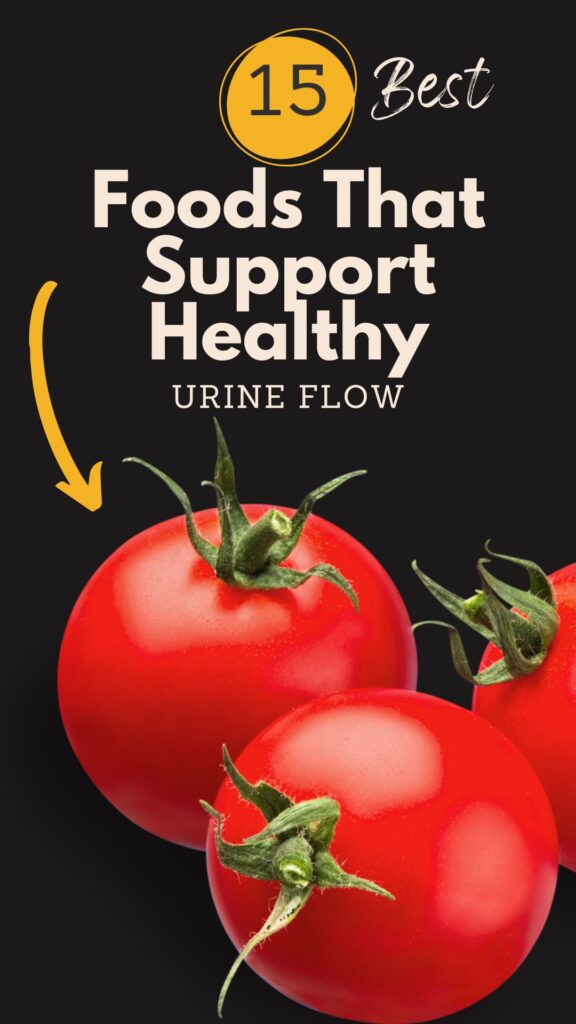Some links in this blog are affiliate links. If you make a purchase through these links, I may receive a small commission. This helps support the site at no extra cost to you.
Did you know that your urinary system plays a vital role not just in eliminating waste but also in balancing fluids, blood pressure, and electrolytes?
Yet, many people don’t pay attention to it until problems like frequent urination, burning sensation, or weak urine flow appear.
Urine flow can be affected by dehydration, urinary tract infections (UTIs), enlarged prostate in men, or even certain dietary habits. Interestingly, the foods you eat can either support or strain your urinary system.
By choosing the right foods, you can naturally promote healthy urine flow, reduce the risk of kidney stones, and keep your bladder functioning at its best.
In this article, we’ll explore 15 foods that support healthy urine flow—backed by nutrition science and practical tips. You’ll learn:
- Which foods act as natural diuretics to improve urine flow.
- The best ways to eat or prepare them for maximum benefit.
- Who should consume them (and who should avoid them).
- Storage and buying tips so you always get the most out of them.
- Do’s and Don’ts, along with possible side effects to watch for.
Let’s dive into the list!

Table of Contents

15+ Best Foods For Healthy Urine Flow
1. Cucumbers
Cucumbers are over 95% water, making them one of the best hydrating foods for healthy urine flow. Their high-water content helps flush toxins, prevents urinary infections, and reduces inflammation in the urinary tract.
Best Ways to Eat or Use It
- Eat raw in salads or sandwiches.
- Blend into detox smoothies.
- Add cucumber slices to infused water.
Who Should Eat / Avoid
- Good for: people prone to dehydration, kidney stone prevention.
- Avoid if: you have sensitive digestion or frequent bloating.
Storage & Buying Tips
- Choose firm, dark green cucumbers.
- Store in the refrigerator for up to 5 days wrapped in a paper towel.
Do’s & Don’ts
✅ Do: eat with skin for more fiber.
❌ Don’t: store near ethylene-producing fruits like bananas (causes spoilage).
Possible Side Effects
- May cause mild bloating if eaten in excess.
2. Watermelon
Did you know watermelon is a natural diuretic due to its high water and potassium content? It promotes healthy urine flow while flushing out toxins.
Best Ways to Eat or Use It
- Eat fresh slices.
- Blend into juice or smoothies.
- Add to fruit salads.
Who Should Eat / Avoid
- Good for: people with kidney stones or mild urinary infections.
- Avoid if: diabetic patients (due to natural sugars).
Storage & Buying Tips
- Pick watermelons with a yellow field spot and hollow sound.
- Store cut pieces in the fridge for 2–3 days.
Do’s & Don’ts
✅ Do: eat chilled for hydration.
❌ Don’t: consume too much at night (may cause frequent urination).
Possible Side Effects
- Excess may spike blood sugar.
3. Cranberries
Cranberries are famous for preventing urinary tract infections. They contain proanthocyanidins that prevent bacteria from sticking to the bladder wall.
Best Ways to Eat or Use It
- Drink unsweetened cranberry juice.
- Add dried cranberries to oats or salads.
- Take cranberry supplements (if advised by a doctor).
Who Should Eat / Avoid
- Good for: women prone to UTIs.
- Avoid if: you take blood-thinning medications like warfarin.
Storage & Buying Tips
- Fresh cranberries last up to 4 weeks in the fridge.
- Choose juice without added sugar.
Do’s & Don’ts
✅ Do: consume juice in moderation.
❌ Don’t: rely on cranberry juice as a treatment for severe infections.
Possible Side Effects
- Too much can cause stomach upset.
4. Citrus Fruits (Lemons, Oranges, Grapefruit)
Citrus fruits are rich in vitamin C, which acidifies urine and prevents bacterial growth. Lemon water is particularly helpful for improving urine flow and reducing kidney stone risk.
Best Ways to Eat or Use It
- Squeeze lemon into warm water.
- Eat oranges or grapefruits fresh.
- Use citrus zest in salads.
Who Should Eat / Avoid
- Good for: kidney stone prevention, immune support.
- Avoid if: you have acid reflux or ulcers.
Storage & Buying Tips
- Store citrus at room temperature for up to a week.
- Refrigerate for longer freshness.
Do’s & Don’ts
✅ Do: drink lemon water daily.
❌ Don’t: overconsume acidic fruits if you have sensitive teeth.
Possible Side Effects
- May cause enamel erosion if consumed in excess.
5. Celery
Celery acts as a natural diuretic and contains compounds that stimulate urine production.
Best Ways to Eat or Use It
- Eat raw as snacks.
- Blend into juices or smoothies.
- Add to soups and stews.
Who Should Eat / Avoid
- Good for: high blood pressure patients.
- Avoid if: you have low blood pressure.
Storage & Buying Tips
- Store stalks in a damp paper towel in the fridge.
Do’s & Don’ts
✅ Do: pair with hummus for a healthy snack.
❌ Don’t: leave cut celery exposed (loses nutrients quickly).
Possible Side Effects
- Excess may cause low blood pressure.
6. Tomatoes
Rich in lycopene and water, tomatoes promote hydration and improve bladder health.
Best Ways to Eat or Use It
- Fresh in salads.
- Cooked with olive oil for better lycopene absorption.
- Tomato juice (unsalted).
Who Should Eat / Avoid
- Good for: heart health and urinary tract.
- Avoid if: prone to acid reflux.
Storage & Buying Tips
- Store at room temperature until ripe, then refrigerate.
Do’s & Don’ts
✅ Do: cook lightly for better nutrient release.
❌ Don’t: overcook (destroys vitamin C).
Possible Side Effects
- May trigger acid reflux in some individuals.
7. Garlic
Garlic contains antibacterial compounds that reduce UTI risk and support kidney function.
Best Ways to Eat or Use It
- Crush raw cloves into salads or dips.
- Add to soups and curries.
- Roast for a milder flavor.
Who Should Eat / Avoid
- Good for: immunity and urinary health.
- Avoid if: taking blood thinners.
Storage & Buying Tips
- Store in a cool, dry place. Avoid refrigeration.
Do’s & Don’ts
✅ Do: crush before cooking for maximum allicin release.
❌ Don’t: store peeled garlic for long periods.
Possible Side Effects
- May cause digestive irritation if consumed raw in excess.
8. Pumpkin Seeds
Pumpkin seeds are rich in zinc, which supports prostate health and healthy urine flow in men.
Best Ways to Eat or Use It
- Snack roasted seeds.
- Add to oatmeal or smoothies.
Who Should Eat / Avoid
- Good for: men with prostate issues.
- Avoid if: allergic to seeds.
Storage & Buying Tips
- Store in airtight jars to prevent rancidity.
Do’s & Don’ts
✅ Do: eat a handful daily.
❌ Don’t: eat heavily salted varieties.
Possible Side Effects
- Excess may cause stomach upset.
9. Asparagus
Asparagus is a natural diuretic thanks to an amino acid called asparagine, which increases urine production and flushes excess salts from the body. Historically, it has been used in herbal medicine to support kidney and bladder function.
Best Ways to Eat or Use It
- Lightly steam or grill asparagus.
- Add to omelets, pasta, or stir-fries.
- Blend into green soups.
Who Should Eat / Avoid
- Good for: people with mild water retention or kidney stone prevention.
- Avoid if: you have uric acid-related gout (can worsen symptoms).
Storage & Buying Tips
- Choose firm stalks with closed tips.
- Store upright in a jar with a little water, covered with a plastic bag in the fridge.
Do’s & Don’ts
✅ Do: cook lightly to preserve nutrients.
❌ Don’t: overcook—it becomes mushy and loses nutrients.
Possible Side Effects
- May cause a strong odor in urine (completely harmless).
10. Ginger
Ginger is known for its anti-inflammatory and antibacterial properties. It supports healthy urine flow by reducing inflammation in the urinary tract and preventing bacterial growth.
Best Ways to Eat or Use It
- Brew fresh ginger tea.
- Add grated ginger to soups and curries.
- Blend into smoothies for a spicy kick.
Who Should Eat / Avoid
- Good for: people prone to UTIs or urinary discomfort.
- Avoid if: taking blood-thinning medication.
Storage & Buying Tips
- Choose firm ginger roots with smooth skin.
- Store in a paper bag in the refrigerator.
Do’s & Don’ts
✅ Do: use fresh ginger for best potency.
❌ Don’t: store peeled ginger uncovered (it dries out).
Possible Side Effects
- Too much ginger may cause stomach upset or heartburn.
11. Parsley
Parsley is more than a garnish—it’s a natural diuretic that increases urine output while delivering vitamin C and antioxidants. In traditional medicine, parsley tea has long been used to cleanse the kidneys.
Best Ways to Eat or Use It
- Use fresh parsley in salads or as a garnish.
- Brew parsley tea.
- Blend into green juices.
Who Should Eat / Avoid
- Good for: detox diets and urinary tract health.
- Avoid if: pregnant women (large amounts may stimulate uterine contractions).
Storage & Buying Tips
- Wrap fresh parsley in a damp paper towel and refrigerate.
Do’s & Don’ts
✅ Do: use fresh leaves for more potency.
❌ Don’t: rely on dried parsley alone (lower in nutrients).
Possible Side Effects
- Excess may cause low blood pressure in sensitive people.
12. Spinach
Spinach is rich in magnesium, potassium, and water—making it great for hydration and urinary system balance. Its natural alkalinity also helps prevent UTIs by creating an environment less favorable for bacteria.
Best Ways to Eat or Use It
- Blend raw spinach into smoothies.
- Lightly sauté with olive oil and garlic.
- Add to soups or salads.
Who Should Eat / Avoid
- Good for: athletes and those needing electrolyte balance.
- Avoid if: prone to kidney stones (due to oxalates).
Storage & Buying Tips
- Store unwashed spinach in a sealed bag in the fridge.
Do’s & Don’ts
✅ Do: eat both raw and cooked.
❌ Don’t: leave spinach wet—it spoils quickly.
Possible Side Effects
- Excessive intake may increase kidney stone risk.
13. Pomegranate
Pomegranate juice and seeds are excellent for bladder health, thanks to antioxidants that reduce inflammation and protect urinary tract lining. It also has mild diuretic effects.
Best Ways to Eat or Use It
- Eat fresh pomegranate seeds.
- Drink unsweetened pomegranate juice.
- Add to salads or yogurt bowls.
Who Should Eat / Avoid
- Good for: heart and urinary health.
- Avoid if: you’re on blood pressure medication (may amplify effects).
Storage & Buying Tips
- Whole fruits last weeks at room temperature.
- Refrigerate seeds in airtight containers.
Do’s & Don’ts
✅ Do: choose deep red fruits for maximum antioxidants.
❌ Don’t: buy juice with added sugar.
Possible Side Effects
- Excess juice may interact with certain medications.
14. Barley Water
A traditional home remedy in many cultures, barley water works as a natural diuretic. It helps cleanse the urinary tract, reduces burning sensation during urination, and may prevent kidney stones.
Best Ways to Eat or Use It
- Boil barley grains in water and drink strained liquid.
- Flavor with lemon or honey for taste.
Who Should Eat / Avoid
- Good for: those with frequent UTIs or kidney stone risk.
- Avoid if: gluten-sensitive or celiac disease patients.
Storage & Buying Tips
- Store barley grains in a cool, dry place.
- Drink barley water fresh (within 24 hours).
Do’s & Don’ts
✅ Do: drink warm for soothing effects.
❌ Don’t: store prepared barley water for too long (ferments).
Possible Side Effects
- May cause bloating if consumed in excess.
15. Green Tea
Green tea contains antioxidants called catechins that promote kidney health and help flush out toxins. Its mild caffeine content acts as a natural diuretic, supporting urine flow.
Best Ways to Eat or Use It
- Brew hot green tea (avoid over-steeping).
- Drink iced green tea with lemon.
- Use matcha in smoothies.
Who Should Eat / Avoid
- Good for: detox and urinary health.
- Avoid if: sensitive to caffeine.
Storage & Buying Tips
- Store tea leaves in an airtight, dark container.
Do’s & Don’ts
✅ Do: drink 1–2 cups daily.
❌ Don’t: drink late at night (may disrupt sleep).
Possible Side Effects
- Too much caffeine can cause frequent urination or jitters.
16. Coconut Water
Often called “nature’s sports drink,” coconut water is rich in potassium and magnesium. It hydrates deeply, balances electrolytes, and prevents kidney stones by improving urine flow.
Best Ways to Eat or Use It
- Drink fresh coconut water directly.
- Add to smoothies.
- Use as a natural rehydration drink after exercise.
Who Should Eat / Avoid
- Good for: athletes, people prone to dehydration.
- Avoid if: you have kidney disease requiring potassium restriction.
Storage & Buying Tips
- Always choose fresh tender coconuts.
- Store bottled coconut water in the fridge.
Do’s & Don’ts
✅ Do: drink after workouts for rehydration.
❌ Don’t: overconsume packaged versions with added sugar.
Possible Side Effects
- Too much can raise potassium levels in people with kidney issues.
Conclusion
Your urinary system silently supports your body’s balance every day. From hydrating cucumbers and watermelon to kidney-cleansing parsley and barley water, the foods you eat can either strengthen or weaken it. By adding these 15 foods that support healthy urine flow, you can naturally:
- Stay hydrated.
- Prevent urinary infections.
- Lower kidney stone risk.
- Improve overall kidney and bladder function.
Remember, moderation is key. Pair these foods with a balanced diet, plenty of water, and healthy lifestyle habits for long-term urinary wellness.
Have you tried any of these natural remedies before? Share your experience—or even a favorite recipe—in the comments below. Your tip might help someone else maintain better urinary health!
Frequently Asked Questions (FAQs)
Can cranberry juice cure urinary tract infections (UTIs)?
Cranberry juice can help prevent UTIs by stopping bacteria from sticking to the bladder wall, but it is not a cure. If you already have a UTI, medical treatment (such as antibiotics prescribed by a doctor) is necessary.
How much water should I drink daily for healthy urine flow?
Most adults should aim for 8–10 cups of water per day, depending on climate, activity level, and health conditions. Hydration supports kidney function and ensures smooth urine flow.
Is coconut water good for the kidneys?
Yes, coconut water is rich in electrolytes and helps prevent kidney stones by diluting urine. However, people with chronic kidney disease who need to limit potassium intake should drink it in moderation.
Do citrus fruits help with urine flow?
Yes. Citrus fruits like lemons and oranges contain vitamin C, which acidifies urine and prevents bacterial growth. Lemon water is particularly effective in supporting healthy urine flow and reducing the risk of kidney stones.
Can eating too much spinach harm urinary health?
Spinach is healthy but also high in oxalates, which may contribute to kidney stones if consumed in excess. Moderation is important, especially for those with a history of stones.
Are natural diuretic foods safe for everyone?
Natural diuretics like cucumber, celery, and parsley are generally safe. However, people with low blood pressure, kidney disease, or those on certain medications (like diuretics or blood thinners) should consult their doctor before increasing intake.
Does green tea increase urination?
Yes, green tea contains mild caffeine, which acts as a natural diuretic. Drinking 1–2 cups daily can promote healthy urine flow, but too much may lead to frequent urination or disturbed sleep.
Can these foods replace medication for urinary problems?
No. While foods can support urinary health and prevention, they cannot replace prescribed treatments for conditions like UTIs, kidney infections, or prostate problems. Always consult a healthcare professional.










